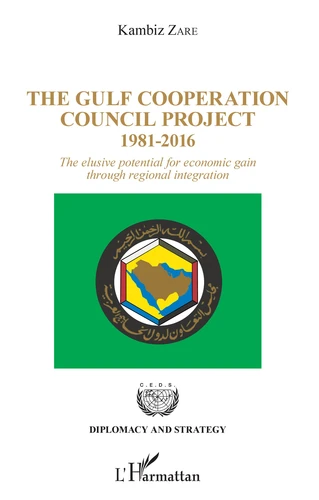The Gulf Cooperation Council Project - 1981-2016. The elusive potential for economic gain through regional integration
Par :Formats :
- Paiement en ligne :
- Livraison à domicile ou en point Mondial Relay indisponible
- Retrait Click and Collect en magasin gratuit
- Réservation en ligne avec paiement en magasin :
- Indisponible pour réserver et payer en magasin
- Nombre de pages252
- PrésentationBroché
- FormatGrand Format
- Poids0.394 kg
- Dimensions15,0 cm × 24,0 cm × 1,2 cm
- ISBN978-2-343-16448-9
- EAN9782343164489
- Date de parution04/01/2019
- CollectionDiplomacy and Strategy
- ÉditeurL'Harmattan
Résumé
In this book, the economist Kambiz Zare throws new light on one of the most discussed international economic integration projects of our time - that of the Gulf Cooperation Council. Created in 1981 by Saudi Arabia, Qatar, Kuwait, Bahrain, the United Arab Emirates and Oman, this ambitious regional project had political, economic and financial aspirations, but its success has been decidedly uneven. To explain why, the author examines the feasibility of the GCC project from today's perspective, contrasting the evolving economic and financial circumstances in the six countries with the conditions that are necessary for regional integration to be achieved.
In doing this, Dr. Zare clarifies why the GCC's potential to bring economic gain to the region and its people has been so elusive. By focusing on the GCC's first 35 years, from 1981 to 2016, the book offers a firm groundwork for understanding the ongoing dynamics of the GCC region. Its relevance is highlighted by the current political tensions that have arisen among certain member countries : might they have been averted through greater attention to the building blocks of economic and financial cohesion ?
In doing this, Dr. Zare clarifies why the GCC's potential to bring economic gain to the region and its people has been so elusive. By focusing on the GCC's first 35 years, from 1981 to 2016, the book offers a firm groundwork for understanding the ongoing dynamics of the GCC region. Its relevance is highlighted by the current political tensions that have arisen among certain member countries : might they have been averted through greater attention to the building blocks of economic and financial cohesion ?
In this book, the economist Kambiz Zare throws new light on one of the most discussed international economic integration projects of our time - that of the Gulf Cooperation Council. Created in 1981 by Saudi Arabia, Qatar, Kuwait, Bahrain, the United Arab Emirates and Oman, this ambitious regional project had political, economic and financial aspirations, but its success has been decidedly uneven. To explain why, the author examines the feasibility of the GCC project from today's perspective, contrasting the evolving economic and financial circumstances in the six countries with the conditions that are necessary for regional integration to be achieved.
In doing this, Dr. Zare clarifies why the GCC's potential to bring economic gain to the region and its people has been so elusive. By focusing on the GCC's first 35 years, from 1981 to 2016, the book offers a firm groundwork for understanding the ongoing dynamics of the GCC region. Its relevance is highlighted by the current political tensions that have arisen among certain member countries : might they have been averted through greater attention to the building blocks of economic and financial cohesion ?
In doing this, Dr. Zare clarifies why the GCC's potential to bring economic gain to the region and its people has been so elusive. By focusing on the GCC's first 35 years, from 1981 to 2016, the book offers a firm groundwork for understanding the ongoing dynamics of the GCC region. Its relevance is highlighted by the current political tensions that have arisen among certain member countries : might they have been averted through greater attention to the building blocks of economic and financial cohesion ?




